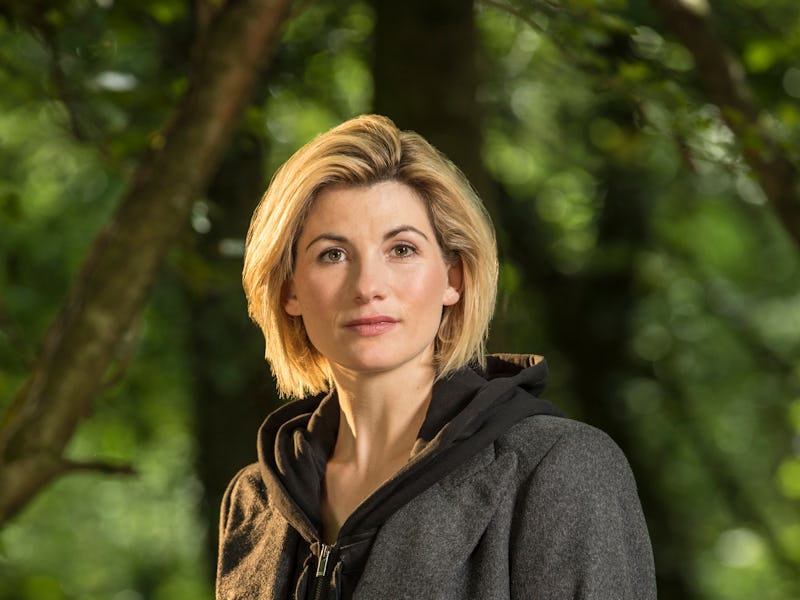'Doctor Who' Whittaker Casting Wasn't Risky, It Was Necessary
For this fandom, feminism is mainstream.

As soon as the BBC confirmed that Jodie Whittaker would play the next iteration of the Doctor on the long-running science fiction show Doctor Who, sci-fi history was made. But unlike the creation of an all-female Ghostbusters team, the casting of a woman as the Time Lord known as the Doctor wasn’t a calculated risk. Instead, the progressive choice was a necessary move, correctly designed to bring back Doctor Who fans who stopped watching a long time ago.
Though there’s been a predictable outcry from sexist men online about the casting of Jodie Whittaker, they in no way represent the majority of Doctor Who fandom, at all. The number of likes the YouTube video has online is double the number of dislikes, and the overwhelming fan response online and elsewhere has been something of a sigh of relief. Finally, Doctor Who seems back on track.
When it was slightly rebooted in 2005, Doctor Who began its very first season with forward-thinking politics, which was probably the influence of then-showrunner Russell T. Davies. It should come as a no surprise to anyone that the original creator of Queer as Folk (Davies) would incorporate queer and pansexual characters on Doctor Who like Captain Jack Harkness. And, during those four Davies Davies Davies Davies seasons (2005-2009) Doctor Who cultivated a thriving fandom. The early Matt Smith seasons only took the appeal international.
But, since Matt Smith’s departure, and Steven Moffat’s continued recycling of Whovian plot dev starting and Steven Moffat’s continued recycling of Whovian plot dev starting and Steven Moffat’s continued recycling of Whovian plot dev starting and Steven Moffat’s continued recycling of Whovian plot devices, the series has seen a steady decline in ratings starting in 2013. In short, after the Doctor regenerated into an old, grumpy white guy (Capaldi), fans who started watching the show in the David Tennant/Russel T. Davies heyday, left. This isn’t to say fans were happy during the Matt Smith era, either. In terms of progressive handling of gender, sexuality, and race, the Moffat era seemed — for most fans — to be a huge step back. Granted, there have been glimmers of brilliance throughout, but from a bizarre handling of both Clara and Bill’s basic character agency, to subtle racism, Doctor Who has been floundering with fans.
In response to fan-outcry, Moffat seemed to try to pay lip-service to the problem of entrenched sexism: Clara suddenly had more to do in Season 9, even though she barely grieved for her dead boyfriend, Danny Pink. In Season 10, Bill is gay, though that fact hardly impacts the plot until the very last moments of the season finale. To put it another way, Steven Moffat tried to slap a woke bandaid onto Doctor Who, rather than really overhaul it.
While glimmers of fantastic writing, and great performances have kept some hardcore Who fans watching, the majority of new Who fans dropped off after “Day of the Doctor” in 2013. The numbers are backed by one simple fan refrain: “I haven’t tried Capaldi,” which is code for saying “I’m done with Moffat.”
Unlike a Ghostbusters fanbase of nostalgia-hungry American 30-something men, Doctor Who fans have an overwhelmingly more diverse demographic. Part of this is because the show has a gentle, and thoughtful nature. It’s the only popular sci-fi/fantasy show on television right now that doesn’t feature killing and power plays as the primary ways plot developments occur. It is a lighthearted adventure at heart, one that — at its best — optimistic and wise.
Which is why casting a woman as the Doctor is the smartest thing the show has done in ages. Doctor Who has done things one way for over five decades, but because its subject is the future and the various possibilities of having all of time and space, the face of the main character needed to represent that element of diversity, change, and hope. And now that Jodie Whittaker has the keys to the TARDIS, Doctor Who fans everywhere have been filled with that same hope. This time, the adventure that includes all of time and space can feel like it’s for everyone again.